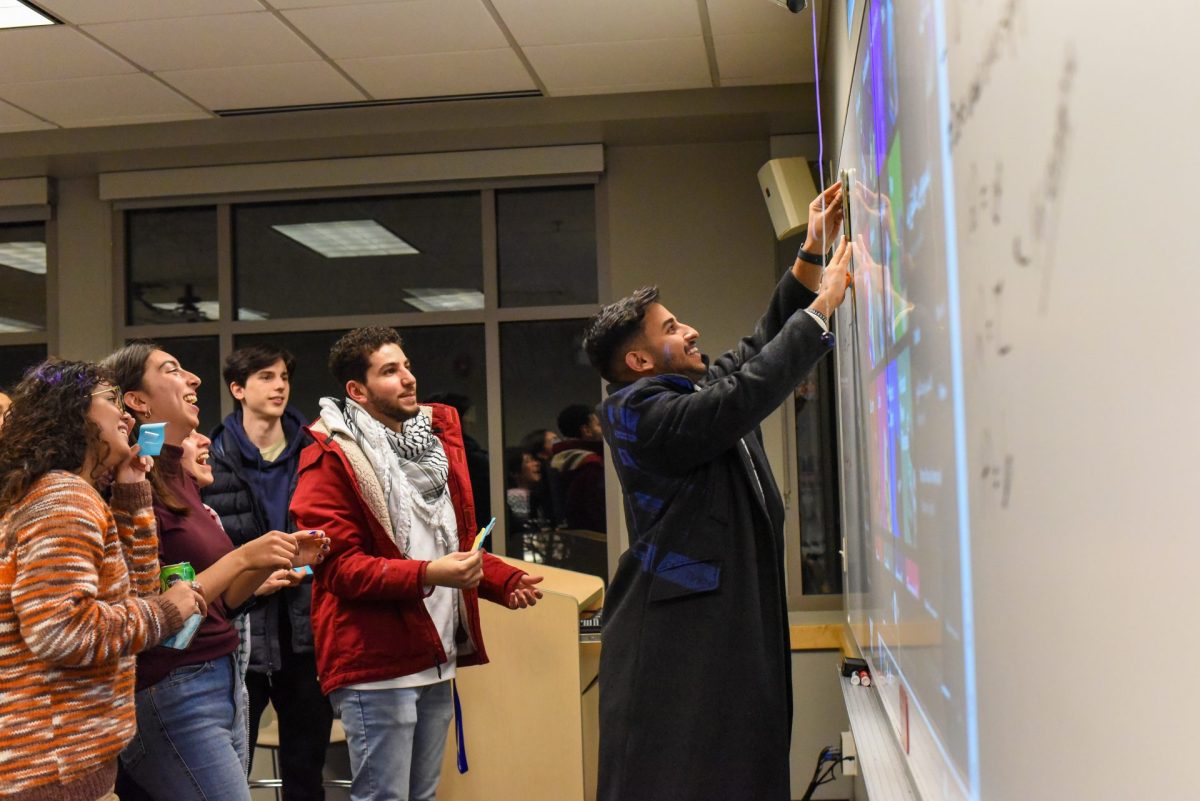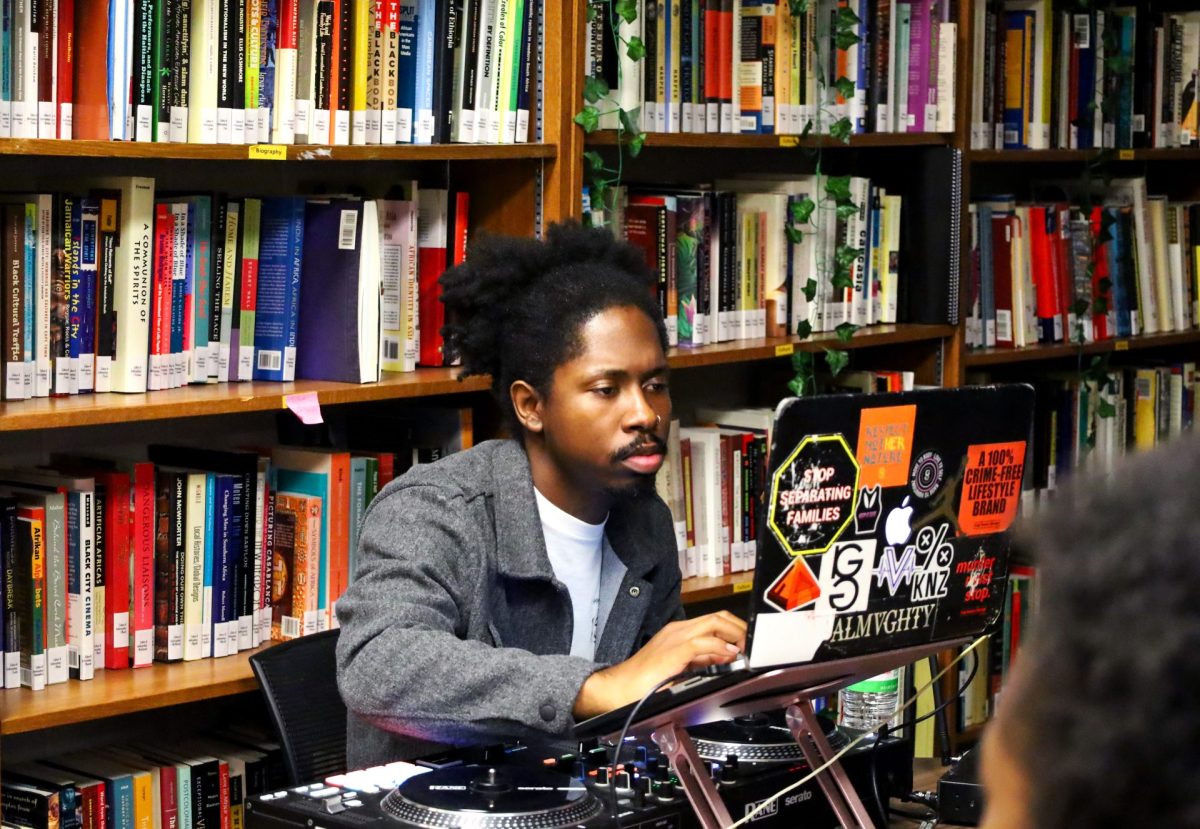An increasing number of DePaul students are ditching classrooms and taking courses online in homes, hotels and coffee shops – 24-hours a day.
And those homes, hotels and coffee shops may be scattered across the globe, according to Joseph Vu, associate professor in the Department of Finance.
“I have students taking my course from Japan, from China, from Bahrain, and from several states: California, Wisconsin, Indiana, New York,” Vu said.
Online enrollments increased 413 percent from 1,122 to 5,751 from 2006 to 2012, according to a DePaul press release. Quarterly course offerings soared from 150 to 400 during the same period. Work schedules, commutes and family commitments are some of the reasons students said they explore online options.
“Everyone’s online all the time anyway, so why not make it more interactive in the school sense of it?” said Kristina Nevins, who took five online courses before graduating from DePaul in 2012.
DePaul joins other U.S. universities whose online enrollments are skyrocketing. A 2011 national study conducted by the Babson Survey Research Group reported that online enrollments grew at a rate of 10 percent, as compared to less than one percent growth of the overall higher education student population.
According to DePaul’s recently released strategic plan, “Vision 2018,” online options are here to stay.
“The strategic plan is calling for an increased attention to this flexibility,” said GianMario Besana, DePaul’s associate vice president for Academic Affairs in Online Learning and Internationalization. According to Besana, the university is considering adding more online, hybrid and evening courses to make access to the quality of education that DePaul offers more flexible.
Josh Dysart, a graduate student in the New Media Studies program, appreciates the flexibility.
“Whether it’s during my lunch break here at work, first thing in the morning at home, last thing before I go to bed, you know there’s really an opportunity to do it at various times of day rather than being there in the physical classroom,” said Dysart.
Online courses typically consist of video lectures, narrated PowerPoint presentations, discussion boards, quizzes, and may even include chats and tweets. Students may also choose hybrid courses that split instructional time between the classroom and online activities.
“I definitely feel that the level of learning online mirrors if not exceeds the experience of sitting in the classroom,” said Darren Eyseter, a DePaul MBA student who believes students get as much out of an online course as they put in.
But some faculty members wonder if computers are as effective as the classroom. According to Erik Peterson, adjunct faculty member in the College of Communication, critics of online courses fear less interaction, more cheating, and the loss of the classroom social experience. It can be more difficult to create valuable relationships and long-lasting learning communities.
“I got a Ph.D. to interact with students, and so if we’re going to move more toward online, we really need to master how we can still do that and still feel like you’ve touched and seen students,” said Kelly Richmond Pope, an associate professor teaching online courses for the School of Accountancy and Management Information Systems.
Peterson admits he initially had doubts.
“I thought, how could a computer experience ever replace a teacher in a classroom?” said Peterson, but teaching online changed his outlook.
“I’m a convert in some respects, but I just really think of it as a different way of learning, not better or worse,” he said.
Adding live chats and webinars to online course activities helps Pope, Peterson and other faculty members get to know students better.
While it may be challenging to recreate the classroom experience, Pope believes the online learning environment offers advantages.
“You really are dealing with a student one-on-one, because if one student emails you, then one student has a question to you,” she said. “I actually put more time, more student contact time in on my online class.”
Theresa Steinbach, associate professor in the College of Computing and Digital Media, agreed.
“I spend more time interacting with online students whether it be via email, Skype, online office hours, or in the discussion forum than I do with my in-class students,” said Steinbach.
Digital discussion boards also boost student and faculty interactions. Jaclynne Madden, a graduate student, is taking her second online course titled “Internet and Interactive Marketing.”
“It’s basically like Facebook,” said Madden. “You’re seeing what people post and what other people have posted in response…and you have to get into the conversation.”
“In class I’m not a person that sits there and raises their hand ever, to be honest,” said Nevins.” So when I’m doing it online I’m always participating because it’s required so therefore I’m listening more.”
Students looking for an easy class might want to think twice about taking a class online.
“You have more work in online courses,” said Madden. “I think the professors expect you to read a lot more, watch videos each week and take notes,” she said.
Peterson said he expects additional work from online students, “I feel I can actually assign more total work because students are obligated in many ways to replace their in-class time.”
Besana said that DePaul has worked hard to assure that online courses are on par with the classroom.
“We’ve been extremely careful from the very beginning in insuring that whatever we put online has the same if not more quality control that we put on the courses we offer face-to-face,” said Besana. “It’s not DePaul light.”
A 2010 national report revealed online students outperform those in the classroom. The report prepared by SRI International for the U.S. Department of Education examined 99 studies between 1996 and 2008.
It concluded, “Students in online conditions performed modestly better, on average, than those learning the same material through traditional face-to-face instruction.”
In order to be successful online, learners need to be organized, self-disciplined, comfortable with technology and able to meet deadlines, according to both students and faculty. Some students struggle with online classes because they lack organizational skills, not because they do not understand the materials.
“They turned things in late, they didn’t know what was due, they didn’t know how to attach the assignment properly,” said Pope.
Writing everything down helped Nevins hit course deadlines on time. She recommends reading the syllabus carefully and putting assignment due dates in a planner.
The faculty also needs new strategies to develop and lead online courses. Many extend their skills by participating in DePaul’s Online Teaching Series (DOTS). The program won national recognition when it received the 2012 Sloan Consortium (Sloan-C) in September for excellence in faculty development for online teaching, according to a DePaul press release.
“I think the DOTS program does a great job of exposing people to how to replicate or modify some of the things they do in the face-to-face environment to make them work in the online environment,” said Peterson.
Pope offers advice to students who want to determine if faculty members will teach effectively online: “You know what I would do?” she asked. “I would send them an email and see how long it takes them to get back to me. That would be my first test.”
ξ
Sidebar:
The DePaul Online Teaching Series (DOTS) received the 2012 Sloan Consortium (Sloan-C) award in September, which recognizes institutions that have developed and delivered an outstanding online teaching program for faculty.
DePaul established DOTS in 2008 to train and support faculty in the development of high-quality online and hybrid courses. In the past five years, 239 faculty members from 34 departments of eight colleges and programs have attended DOTS. The program introduces faculty to online-learning best practices and innovative uses of technology.
The program consists of three phases:
Training: Faculty commits to 36 hours of online and onsite learning activities offered in quarter-long and three-week intensive formats. Both formats begin with a week of immersive online learning experience followed by six onsite meetings and continued online activities.
Course Development: Faculty receives assistance in planning, building, and revising their online or hybrid course with ongoing support from a designated instructional designer and a team of course developers.
Course Review: Certified Quality-Matters (QM) reviewers at DePaul use the QM rubric to ensure all courses meet QM standards and follow best practices in online course design.
DePaul provides each DOTS participant with a $1,500 stipend and a technology kit that includes a laptop computer, webcam, headset, microphone and essential software for online course development. In return, tenure-track faculty must develop and teach at least one online or hybrid course within 18 months of completing DOTS training. Adjunct faculty are required to develop a course but are not required to teach it.
DOTS has become the driving force for the rapid growth of online courses and programs at DePaul, including a 167 percent increase in online course offerings and a 413 percent increase in online enrollment, from 1,122 in spring 2006 to 5,751 in spring 2012.
ξ
The growth of online and hybrid courses has allowed several schools and colleges to launch the following online and hybrid programs:
-College of Education: LBS1 Endorsement, Type 75 Certificate, Curriculum Studies w/Type 75, Ed Leadership
-School of Public Service: MS of Publish Service Management, Master of Public Admin
-Driehaus College of Business: CPA Review, MS Accounting (to be launched in fall 2012)
-College of Communication: Of its eight undergraduate majors, four can be taken online and two can be taken in a hybrid format.
-College of Science and Health: psychology major (to be launched in winter 2013) Doctor of Nursing (hybrid, fall 2012)







